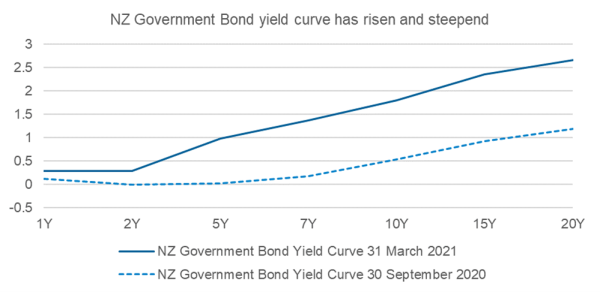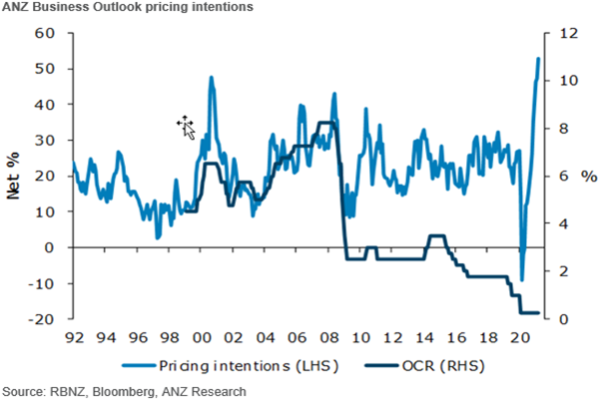
May 12, 2021
The announcement in late 2020 of effective vaccines for COVID-19 illuminated a path to return to normalcy. The US and the UK have rapidly rolled out their vaccine programmes and while there are risks for further setbacks, there is now a sense that the world may start re-opening. This is fantastic news for people’s health and families that have been kept apart, but its effect on the financial markets is less clear. The share market is forward looking so it reacts to events that investors think might impact on future returns, rather than on immediate issues. The potential implications of the vaccine and world re-opening are already being felt in the financial markets, and not always in a positive way.
COVID-19 and the more recent vaccine news has had a strong impact in the fixed interest asset class. In September 2020 yields were at an all-time low (i.e. their prices went up), with the New Zealand10-year government bond yield down to an extraordinary 0.46% p.a., as investors sought safer assets in this uncertain time. Some short-term bonds were selling at negative yields due to the expectation that New Zealand would need a negative Official Cash Rate (OCR) to help stimulate the economy.
Soon after the news about the development of effective vaccines it became clear that a negative OCR would not be needed and bond yields started to rise, especially the longer-dated bonds. Investors required a higher return for fixed interest investments which led to the New Zealand 10-year government bond climbing to 1.7% p.a, more than tripling in the six months to 31 March 2021.

This rise in interest rates wasn’t only happening in New Zealand; US interest rates reacted similarly with their 10-year government bond reaching a low point of 0.55% p.a, before rising to 1.7% p.a in March 2021. You might have noticed that the US government bond yields are currently similar to those we have in New Zealand. This was not the case historically where generally New Zealand bonds traded at a significantly higher rate compared to the US. This was because the US was seen as the global safe haven which kept their bond yields low.
Rising interest rates have led to some negative returns in fixed interest assets, especially the longer-term bonds. You will have seen this negative performance in your portfolio, especially over the past three months.
The rise in interest rates has also impacted the share market, especially those markets which have benefitted from attractive dividend yields. The New Zealand market is one such example, with a higher sensitivity to bond yields compared to most share markets. New Zealand has seen many defensive, high-yielding companies, such as infrastructure, property and utilities, with pricing based on how their dividend premium compares to bonds. Because of this, they perform similarly to bonds when interest rates change. The value of these companies increased during times of falling interest rates and decreased in a rising interest rate environment as investors required a higher premium to justify the additional risk.
Another impact of the pandemic and ensuing vaccine roll-out has been the disruption and change to global supply chains. A world in lockdown and recession had a much different level of demand for different types of goods, than when movements are unrestricted. The backlog of supplies due to lockdowns is still being worked through and the change in demand of a post-pandemic economy is expected to place additional stress on supply chains. This is expected to result in higher prices for most imported goods, which should flow through to higher inflation.
In New Zealand, the March 2021 ANZ Business Outlook survey shows expectations of cost increases are at the highest level in more than decade. It stated that 74 per cent of firms expect higher costs, with a 49 per cent planning to raise their prices in response. Firms’ inflation expectations remain slightly below 2 per cent although they are still the highest in two years. The RBNZ will likely look through any near-term spike in inflation, confident it will be temporary, and reassured by inflation expectations that appear locked into the 2% CPI target midpoint.

While a world of unrestricted movement may still be some time away, the vaccine is already having a profound impact on portfolios. The ebb and flow of financial markets over the last year illustrate why we encourage diversification in the assets and countries that you invest in. The US share market for example has not been as negatively affected by its increasing interest rates and has had a strong 2021 to date. Australia, whose share market has been an underperformer for the past decade, was one of the strongest performing developed markets in the past 12 months as it has a larger proportion of companies that should fare better as economies improve. The spread of risk and returns across markets and asset classes is a key risk mitigation tool, with strong markets offsetting weaker markets. This is the reason we construct your portfolio to take advantage of as many markets, geographies and industries as possible.